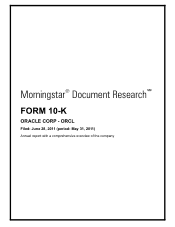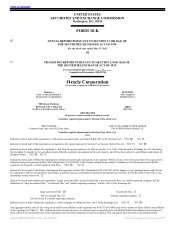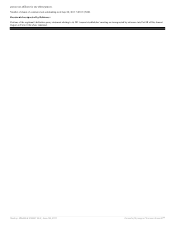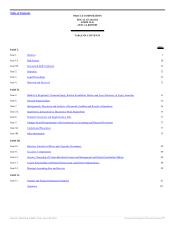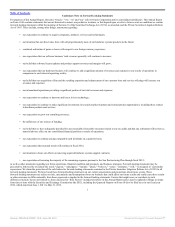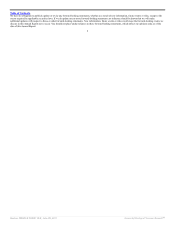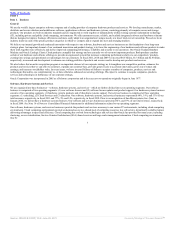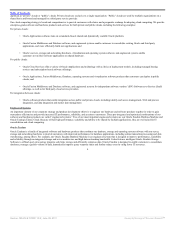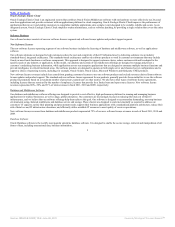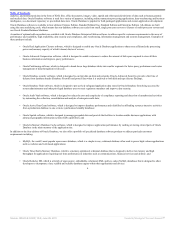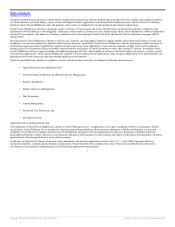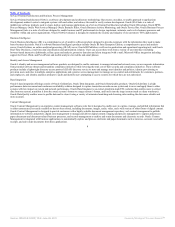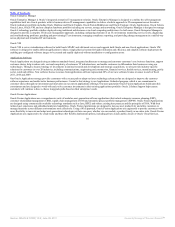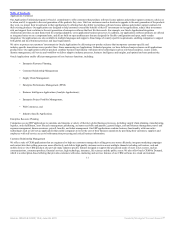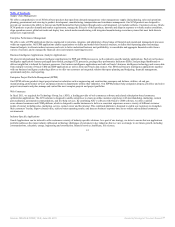Oracle 2010 Annual Report Download - page 7
Download and view the complete annual report
Please find page 7 of the 2010 Oracle annual report below. You can navigate through the pages in the report by either clicking on the pages listed below, or by using the keyword search tool below to find specific information within the annual report.
Table of Contents
PART I
Item 1. Business
General
We are the world’s largest enterprise software company and a leading provider of computer hardware products and services. We develop, manufacture, market,
distribute and service database and middleware software; applications software; and hardware systems, consisting primarily of computer server and storage
products. Our products are built on industry standards and are engineered to work together or independently within existing customer information technology
(IT), including private and public cloud computing, environments. We offer customers secure, reliable, and scalable integrated software and hardware solutions
that are designed to improve business efficiencies and more easily adapt to an organization’s unique needs, at a lower total cost of ownership. We seek to be an
industry leader in each of the specific product categories in which we compete and to expand into new and emerging markets.
We believe our internal growth and continued innovation with respect to our software, hardware and services businesses are the foundation of our long-term
strategic plans. An important element of our continued innovation and product strategy is to focus the engineering of our hardware and software products to make
them work together more effectively and deliver improved computing performance, reliability and security to our customers. Our Oracle Exadata Database
Machine and Oracle Exalogic Elastic Cloud products exemplify this strategy and are currently two of our most important products. Both products combine
certain of our hardware and software offerings to provide an engineered system that increases computing performance relative to our competitors’ products,
creating time savings and operational cost advantages for our customers. In fiscal 2011, 2010 and 2009 we invested $4.5 billion, $3.3 billion and $2.8 billion,
respectively, in research and development to enhance our existing portfolio of products and services and to develop new products and services.
We also believe that an active acquisition program is an important element of our corporate strategy as it strengthens our competitive position, enhances the
products and services that we can offer to customers, expands our customer base, provides greater scale to accelerate innovation, grows our revenues and
earnings, and increases stockholder value. In recent years, we have invested billions of dollars to acquire a number of companies, products, services and
technologies that add to, are complementary to, or have otherwise enhanced our existing offerings. We expect to continue to acquire companies, products,
services and technologies in furtherance of our corporate strategy.
Oracle Corporation was incorporated in 2005 as a Delaware corporation and is the successor to operations originally begun in June 1977.
Software, Hardware Systems and Services
We are organized into three businesses—software, hardware systems, and services—which are further divided into seven operating segments. Our software
business is comprised of two operating segments: (1) new software licenses and (2) software license updates and product support. Our hardware systems business
consists of two operating segments: (1) hardware systems products and (2) hardware systems support. Our services business is comprised of three operating
segments: (1) consulting, (2) Cloud Services and (3) education. Our software, hardware systems, and services businesses represented 68%, 19%, and 13% of our
total revenues, respectively, in fiscal 2011 and 77%, 9% and 14%, respectively, in fiscal 2010. Prior to our acquisition of Sun Microsystems, Inc. (Sun) in
January 2010, we did not have a hardware systems business. Our software and services businesses represented 81% and 19% of our total revenues, respectively,
in fiscal 2009. See Note 16 of Notes to Consolidated Financial Statements for additional information related to our operating segments.
Our software, hardware systems, and services businesses provide the products and services necessary to run various IT environments, including cloud computing
environments. Cloud computing environments provide on demand access to a shared pool of computing resources in a self-service, dynamically scalable manner,
delivering advantages in speed and efficiency. Cloud computing has evolved from technologies and services that Oracle has provided for many years, including
clustering, server virtualization, Service-Oriented Architecture (SOA) shared services and large-scale management automation. Cloud computing environments
may be
3
Source: ORACLE CORP, 10-K, June 28, 2011 Powered by Morningstar® Document Research℠

